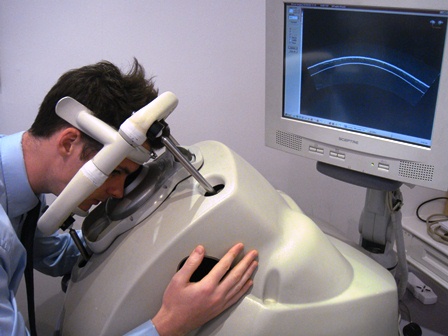NIH Grant Awarded To London Vision Clinic For Eye Disorder Screening
The five year grant awarded by the National Institutes of Health (part of the U.S. Department of Health & Human Services) enables the clinic – together with colleagues at Columbia University in New York (where Dr Dan is a professor) – to continue their on-going work into screening and diagnosing the eye condition which is believed to affect around one person in a thousand.
Keratoconus causes structural changes within the cornea making it thin and change shape. These symptoms create substantial distortion of vision while also ruling out LASIK correction. Screening for signs of the condition is therefore a crucial part of any Laser Eye Surgery preoperative assessment.
At the London Vision Clinic this test is carried out using the Artemis Insight 100 VHF digital ultrasound scanner which was the first and remains the only system in the world that can fully map individual layers within the cornea, including the layer of skin (epithelium) at the front of the cornea. Dr Dan has found that keratoconus can be diagnosed at its earliest stage by a distinctive pattern of epithelial thickness compared to that found in an eye without the condition. These highly accurate epithelial thickness profiles enable London Vision Clinic patients who might otherwise have been turned down for LASIK due to suspected keratoconus, to have the procedure safely and with confidence.
Dr Dan played a crucial role in the development of the Artemis Insight 100 scanner at Cornell University during the 1990s which – with its hugely superior imaging and micro-biometric capabilities – is known to provide the most accurate corneal measurements in the world.
The Artemis Insight 100 scanner can only be found at a handful of clinics worldwide. LoVC was the first clinic to have the Artemis Insight 100™, putting the team there in a unique position to be able to definitively say whether or not a patient has keratoconus where the results of other tests might not have shown any suspicion of the condition.



